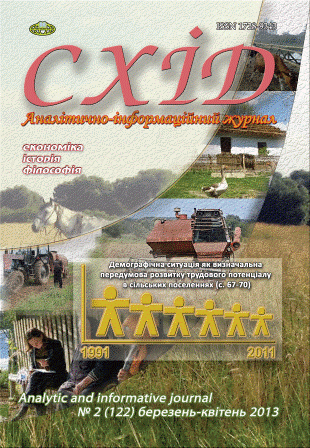Welfare as a sociopsychological category in economics
DOI:
https://doi.org/10.21847/1728-9343.2013.2(122).13462Keywords:
economic welfare, social welfare, subjective well-being, value judgments, the model of "economic man", psychology, sociology, behavioral economicsAbstract
The question of the definition of welfare and the criteria for its measurement, finding ways and means of its formation, occupies a significant place in the history of economic thought. The concept of welfare, and especially its social and psychological characteristics, has never been completely defined, and it still requires thorough research.
In modern conditions of human life, a person's welfare reflects the long process of balancing essential biological and physical as well as complex social needs. The dynamic nature of human welfare does not allow one to examine meeting needs by quantifying the ultimate goal or a clearly defined end state.
Due to the complex human nature, human welfare has been the subject of research and theoretical generalizations in philosophy, economics, sociology, psychology, ethics, and so on. It has also contributed to the development of interdisciplinary sciences such as economic psychology, behavioral economics, and socioeconomics.
The purpose of the article is to emphasize the importance and analyze the possibility of using new interdisciplinary approaches to research welfare.
The article examines the socio-ethical and psycho-emotional assessments that arise in the economics of welfare, from the contact of economic, social, and personal interests, at both the global and national levels. On the basis of sociopsychological theories and ethical tenets, the development of welfare economics is analyzed and the possibility of expanding the research subject of social welfare beyond the principle of utility is argued. The author proposes to consider welfare as a dynamic process of meeting the set of economic, social, and psychological needs of human life.
Downloads
References
Агапова И. И. Экономика и этика: аспекты взаимодействия / И. И. Агапова. - М. : Юристъ, 2002. - 190 с.
Аристотель. Нікомахова етика / Аристотель. - К. : Аквілон-Плюс, 2002. - 480 с.
Bentham J. Deontology; or, The Science of Morality, Vol. I / J. Bentham. - Charleston : BiblioLabs LLC, 2009. - 340 p.
Маслоу А. Мотивация и личность / А. Маслоу ; [пер. с англ.]. - 3-е изд. - СПб. : Питер, 2006. - 352 с.
Agapova I. I. (2002), Ekonomika i etika: aspekty vzaimo¬deystviya, Moscow, 190 р. (rus).
Arystotel (2002), Nikomakhova etyka, Akvilon-Plius, Kyiv, 480 р. (ukr).
Bentham J. (2009), Deontology; or, The Science of Morality, Vol. I, BiblioLabs LLC, Charleston, 340 p.
Maslou A. (2006), Motivaziya i lichnost, Piter, Saint Petersburg, 352 р. (rus).
Downloads
Published
How to Cite
Issue
Section
License
Copyright (c) 2013 Hryhorii Shamborovskyi

This work is licensed under a Creative Commons Attribution-NonCommercial-NoDerivatives 4.0 International License.
1. Authors bear responsibility for the accuracy of facts, quotations, numbers and names used.
2. Manuscripts are not sent back.
3. The publisher does not always agree with the authors' opinion.
4. The authors reserve the right to authorship of the work and pass the first publication right of this work to the journal under the terms of a Creative Commons Attribution-NonCommercial-NoDerivatives 4.0 International License. This license allows others to distribute (copy) the published work for non-commercial purposes, provided there is mandatory attribution to its authors and a link to the first publication in our journal.
5. The authors have the right to conclude separate supplement agreements that relate to non-exclusive work distribution in the form in which it has been published by the journal (for example, to upload the work to the online storage of the journal or publish it as part of a monograph), provided that the reference to the first publication of the work in this journal is included.

